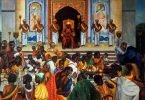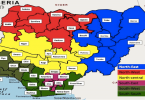This particular article contains the full history and origin of the Igbo people in Nigeria, The Igbo people are one of the major ethnic groups we have in Nigeria. They are majorly located or occupy the Eastern part of Nigeria, which we all know contributes largely to Nigeria’s population today.
The Igbo people are popularly known for their great instinct in starting and handling business. There are four market days in the Igbo land. These market days are Eke, Orie, Afor and Nkwo.

Geography of the Igbo people.
Here are the complete list of eastern states or easterners that are referred to as the Igbo language-speaking people:
Abia, Anambra, Ebonyi, Enugu and Imo states, including a few part of the southern states like Delta and Rivers States in Nigeria that also speak the Igbo language.
The Igbo language is spoken by the people in this area, Although, the English language still remains Nigeria’s general language for decades. Here is some major town in Nigeria that speaks the Igbo language, including: Aba, Abiriba, Awka, Abba, Nigeria, Owerri, Orlu, Nnewi, Mbaise, Nsukka, Enugu, Onitsha, Afikpo, Okigwe, Umuahia, Asaba, Ohafia, Arochukwu, Ngwo, Mbaitoli, Ikeduru and Ihiala and so on.
Beliefs and Religious Thoughts of Igbo People.
The Igbo’s generally believes in a creator and god which they call Chukwuokike Abiama which means Almighty God, this name was the name the Igbo call God in their language.
Which they all believe as their spiritual guard and assistant. In addition to Igbo belief in a supreme deity, the Igbo traditional belief system also included other “lower deities” and providences related to different aspects of Igbo cosmology.
This was in consonance with the African traditional belief systems including those of Ancient Egypt and Ancient Ethiopia (Kush) and it was on these this kind of belief systems that earlier civilizations such as the Greeks based their own belief systems.
Early Western chroniclers such as Homer and Herodotus noted that the Ethiopians (the Ku****es, currently Sudan) were the favourites of the gods and that Greek gods went to Kush to partake in their annual religious rites according to their traditional belief system.
Igbo people also believe in the principal spirits of the sun (which is called Anyanwuin Igbo language), the sky (Igwekaala) and thunder and lightning (Amadioha). There are plenty of other deities related to rivers and streams, forests and sacred woods, agriculture, the days of the calendar which is structured around major and minor market days of the week, professions and so on.
Another principal Igbo deity is Njoku or Ajoku, which they believe as their guardian deity of the yam which in ancient periods or times was the major staple crop of the Igbo people in Nigeria.
In so many parts of Igbo land, there are monthly and yearly annual rituals in honour of the yam deity known as Ifejioku, and in other parts children who were dedicated to the service of the deity were named Njoku. As adults such children were expected to become prosperous yam farmers which made them nobility and business minded.
They also have priest and group of acolytes and devotees in each of their towns that honour it.
It is believed that the Igbo people’s world is divided into three interconnected realms; First, the principal among them is the realm of the living, Secondly, the realm of the dead or of the ancestors, and the last but not the least is the realm of the unborn. Every Individual who led an honourable life and received a proper burial proceeded to the ancestral realm is expected to take their place among the ancestors or Ndichie.
This is where they keep a watchful eye on the clan and visit their loved ones among the living with blessings such as fertility, good health, longevity, prosperity and success, with gratitude the living ones offer sacrifices to them at the family hearth, and seek their counsel.
According to the Igbo’s people, children are referred to and considered as the greatest blessing of all and this is reflected on their popular names like Nwakaego; which means a child is worth more than money or Akuakanwa; which means no wealth is worthier than a child, or Nwabuugwu; which means a child is the greatest honour.
In so many parts of Igbo land, the females or women who successfully deliver ten children are rewarded with special celebrations and rites that honour their hips.
They also believe that Infertility is considered as a particularly harsh misfortune that can ever happen to a man. This is because they believe that it is children who perpetuate the race, and in order to do so children are expected to continue Igbo traditional ways and beliefs.
In Nigeria’s ethnic groups, The Igbo people are usually known in the Nigeria’s history for their republicanism and the failure of monarchical or central political structures among them as a group, this was the reason why the Indirect rule did not work out with the Igbo’s because they believe that there is a king in every man, which means that every man is a king on his or her own lane and nobody is born to serve anyone.
Every Igbo community or clan are usually organized around age groups, social organizations, the revered and accomplished and family heads with a special place for the priest as stated earlier.
In the Igbo land, Deference is paid to the eldest man in the clan, but each and every grown man has a say in the affairs of the community. Every Issue that affects the clan are publicly tabled and discussed and the opinion of each grown man is taken into consideration in order to reach a consensus.
Affairs that particularly affect women are also discussed in women’s groups and accordingly decided and settled. In every Igbo-land community, the daughters of the clan or Umuada (also known as Umumgboto) occupy a special powerful place and could return from their different places of marriage to exercise the breaking vote in matters of grave consequence to the community.
Special individuals are given special rights in their maternal clan and may return to their mother’s home town when threatened or banished from their own hometowns. When it comes to the Igbo people highly accomplished men and women are admitted into orders for people of title such as Ndi Ozo or Ndi Nze.
Such individuals receive certain insignia to show their stature in the community. Memberships in these orders are highly exclusive and to qualify an individual needs more than ordinary material accomplishment or gallantry. They need to be highly regarded and well-spoken of in the community, and most importantly, they must be a person of the greatest integrity, truthfulness, sanity and rich.
According to them, any impeachment of character is enough to disqualify an individual from becoming a person of title and once admitted into the order, people of title are forbidden to lie, cheat, climb a tree, covet or divest a neighbour of their belongings, or commit an abomination and Crime.
Modern religious distribution of Igbo People.
So many Igbo people still practice traditional Igbo religion even though they have been presently Christianized, indigenous beliefs retain some influence, especially in the rural villages.
So many Christian Igbo incorporated many of the culture’s indigenous values, customs and traditions in their own systems into Christian worship, merely deemphasizing their origins and are usually members of the catholic and Anglican Church.
History origin Of Igbo people.
It is believed that the Igbo people settled in their present eastern area thousands of years ago possibly from Egypt/Sudan era.
The Historical origin of the Igbo people is still a subject of speculation and debate. To give some directions on the issue, we must look at Nigeria’s oldest Kingdom, the Nri Kingdom as well as oral tradition.
Just like every other ethnic group in Nigeria, Igbo people are anxious to discover their origin and reconstruct how they came to be how they are, their experiences under colonialism and since Nigeria’s Independence have emphasized for them the reality of their group identity which they want to anchor into authenticated history.
Analysis of the sources available has led researchers to the Nri Kingdom. The Nri Kingdom is also known as the oldest Kingdom ever in Nigeria.
The Exact dating of its establishment is not known and made even more obscure since modern-day popular dating of the Nri Kingdom, 900AD, conflicts with the establishment of another in Nigeria.
Pre-colonial life of Igbo People.
The Pre-colonial Igbo political organization was based on a quasi-democratic republican system of government that guaranteed equality of the citizen as against feudalist communities as witnessed by the Portuguese who first arrived and met with the Igbo people in the 15th century.
Alongside with the exception of a few Notable towns of the Igbo like Onitsha, which had kings called Obi, and places like Nri and Arochukwu, which had priest kings known as Eze that ruled over them; In the precolonial era of Igbo people, communities and area governments were overwhelmingly ruled solely by a republican consultative assembly of the common people.
Tittle holders were respected because of their accomplishments and capabilities, they were never revered as kings, but often performed special functions given to them by such assemblies.
This means different governing was immensely different from most other communities of Western Africa, and only shared by the Ewe of Ghana.
The Igbo secret societies also had a ceremonial script called the Nsibidi. The Igbo people had and still have their indigenous ancient calendar in which a week has four days. Consisting of seven weeks and thirteen months a year. In the last month, an extra day was added. This calendar is still in use in so many villages and towns to determine the market days in Igbo land.
Years ago, the Igbo people also had mathematics called Mkpisi and Okwe used for counting, measurements and a form an ancient strategic Igbo game also called “Okew”.
The Igbo have had a banking system for saving and loans called Isusu which is still in use today in some parts of Igbo land. Many Igbo people carried this system with them during the trans-Atlantic slavery to Jamaica, Cuba, Haiti, the United States, Brazil, Belize, Trinidad and Tobago and so on.
The Colonial Period of the Igbo People.
During the arrival of the British in the 1870s and increased encounters between the Igbo people and other Nigerians, groups led to a deepening sense of a distinct Igbo ethnic identity.
Igbo people also proved remarkably decisive and enthusiastic in their embrace of Christianity and Western education.
During the British colonial rule, the diversity within each of Nigeria’s major ethnic groups slowly decreased and distinctions between the Igbo people and other large ethnic groups in Nigeria, which are the Yoruba and Hausa.
Modern Igbo Society.
After the Nigerian Civil War took place in the 90’s, The Igbo people were seriously devastated because so many hospitals, schools, and homes had been completely destroyed in the bloody war. In addition to the loss of the savings of the Igbo people, they also found themselves discriminated against by other ethnic groups in Nigeria and the new non-Igbo federal government.
Due to the discrimination, so many Igbo employees found it very difficult to cope and they became one of the poorest ethnic groups in Nigeria during the early 1970s.
They gradually rebuilt over a period of twenty years and the economy was prospering once again due to the rise of the petroleum industry in the adjacent Niger Delta regions which led to new factories being set up in the southern part of the country.
Conclusion.
I hope this article has helped you to know various things about this particular people, however, Even till this present time. The Igbo people still continue to face many problems and challenges in Nigeria. By facing discrimination from other ethnic groups in Nigeria.
This is because the traditional Igbo homeland was becoming too small for its growing population; many Igbo have emigrated or relocated out of Igbo-land territory and travelled all over Nigeria and the world.
They are popularly known for their great instinct in starting and managing successful businesses.








Leave a Comment